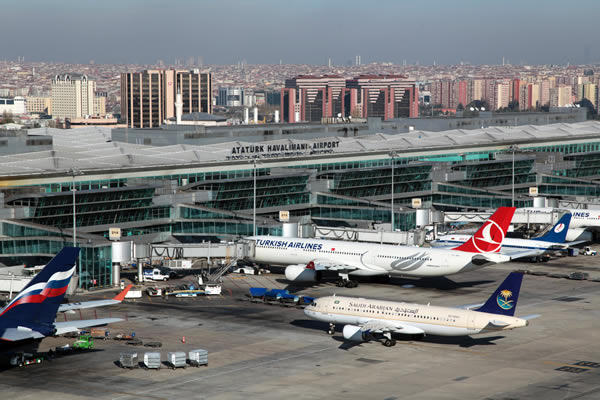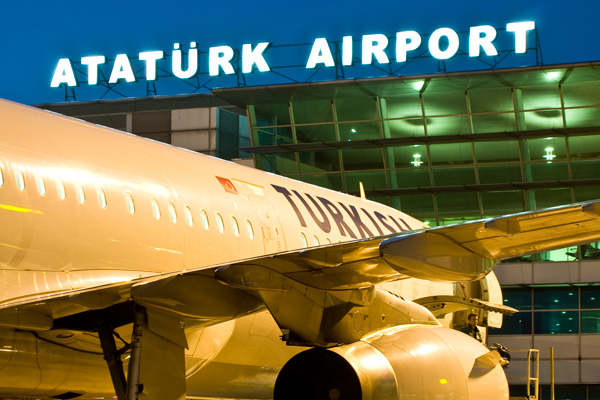TURKEY. A suicide bomb and gun attack at Istanbul Atatürk International Airport has killed at least 36 people and injured over 140.
According to the BBC, three attackers were involved. One reportedly opened fire with a Kalashnikov as the terrorists targeted an entry point to the terminal.
Recent bombings in Turkey have been linked to either Kurdish separatists or the so-called Islamic State group. Prime Minister Binali Yildirim told Turkish and international media that early signs suggested the latter was behind this attack.
The assaults come as a further blow to travel and tourism in Turkey, following a series of terror attacks in Istanbul and Ankara.
The impact on all aspects of the travel and tourism industry have been severe and this atrocity will doubtless make things worse, at least in the short term. In late March, travel retailer Gebr Heinemann said that its duty free sales in Istanbul were down by around -5% in the first three months as a result of geopolitical factors, but the company hoped the business would recover through the remainder of the year.
The United Nations World Tourism Organization strongly condemned the attack.
“On behalf of the entire international tourism community, UNWTO conveys its heartfelt condolences to the families and friends of the victims and expresses its full solidarity with the people and the Government of Turkey,” said UNWTO Secretary-General, Taleb Rifai. “Today we were reminded once again that we are facing a global threat that requires a firm and coordinated response by all governments and the international community.”
Rifai said that safety and security is a priority for the tourism sector, which he said is being targeted as a pillar of the economy and livelihoods in many countries. He called upon the international tourism community to stand by Turkey in facing this challenge and recalled that in such circumstances, “We need to cooperate and not isolate affected destinations.”
He added: “Turkey is a leading tourism destination and we are confident it will continue to be so; it is now time to support Turkey.”

The World Travel & Tourism Council also condemned the attack.
President and CEO David Scowsill said: “Again we find ourselves having to express condolences to victims of a horrendous act of terrorism. The Council stands behind the Turkish government in managing this devastating incident.
“The attack is a further blow to Turkey’s tourism sector, which in 2015 contributed 13% of GDP and generated 2 million jobs. While our research shows that tourism is extremely resilient in the face of terrorism, this latest incident will undoubtedly have far-reaching impacts. The international community, both private and public sectors, must come together in support of Turkey to ensure that as a destination it can rebound and thrive in the future.”
The International Air Transport Association (IATA) has also issued a statement expressing outrage at the attack.
“Once again, innocent travellers have been attacked in a cowardly and murderous act. Our thoughts are with the victims, and their families and friends,” said IATA Director General and CEO Tony Tyler.
“Air transport brings people together and facilitates both social and economic development. Istanbul has a particularly significant and historical role in connecting East and West. Last night’s attack was a broad attack on our shared humanity. But terrorism will never succeed in reversing the interconnectedness of the world. The desire of the human spirit to explore and trade will always triumph over suspicion and fear.”
Tyler said that the fact Istanbul airport was operating today (29 June) was a testament to the “resilience and determination” of the Turkish people and the aviation industry.
“We stand together in solidarity, confident that we will emerge stronger and more united in our resolve to keep connecting our world,” he said.
“The safety and security of passengers are our top priorities. This tragedy in Istanbul and the one in Brussels earlier this year show that there is a growing challenge for governments to keep people safe in the ‘landside’ parts of the airport. Moving people ‘airside’ more quickly can help to mitigate risk. The industry has a number of initiatives in place to achieve that aim and we are working with governments and airports to implement them.”

ACI Europe added its condolences in a statement: “Our thoughts are with the victims, their families and friends and with our airport colleagues at TAV Airports Holding and DHMI.
“This is the latest in a series of terrorist attacks targeting not only airports but various other public spaces. The growing frequency of these attacks indicates that our way of life is intrinsically linked to how we secure significant public spaces where large numbers of people gather.
“In the wake of the terror attacks that took place in Brussels on 22 March (both at the airport and in the city), national authorities across Europe reviewed the security of their airports. As a result, additional measures have been adopted for public areas (landside) at many airports. These additional measures are aimed at reinforcing surveillance & increasing detection capabilities and they remain in place at this time.
“Last night’s attack took place at an airport that has systematic landside security checks on all passengers and visitors as they enter the terminal buildings. Many of the fatalities occurred while people were queueing to access the terminal building – an unfortunate reminder that this kind of additional security measure tends to move the target rather than actually securing it. We must face the reality that when dealing with a terror threat based on suicide bombing, no security measures can ensure 100% protection.”
ACI Europe Director General Olivier Jankovec commented: “Security is paramount and we the airport industry remain firmly committed to continuously improving the quality and efficiency of security measures. Airports are already among the most regulated spaces in this regard.
“What happened yesterday in Istanbul shows us that the real challenge now is to stop terrorists before they ever reach an airport or any other public space – I cannot reiterate enough, better intelligence and more effective information exchange and cooperation between the competent public authorities needs to become the highest priority.”












